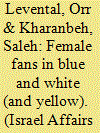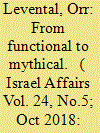|
|
|
Sort Order |
|
|
|
Items / Page
|
|
|
|
|
|
|
| Srl | Item |
| 1 |
ID:
172153


|
|
|
|
|
| Summary/Abstract |
Public campaigns aimed at preventing the demolition of sports venues represent a recent trend to recognise them as legitimate expressions of local sports culture. This article focuses on analysing what fans feel about these sports venues and the need to preserve them. Its main goal is to examine this growing phenomenon, which could affect modern preservation trends and the built heritage of sports. Focusing on the Israeli context, the article includes qualitative analysis of fans’ internet feedback expressing their attitudes towards preservation of sports facilities compared to preserving buildings associated with other cultural pursuits. It also features a series of interviews with fans and analysis of articles published in sports sections of newspapers, journals and sports blogs. The qualitative analysis shows that fans attribute five heritage values to sports venues as well as assign them historical community importance, and they do so consciously but primarily unconsciously. Thus, the primary obstacle to the decision to preserve sports venues is not the degree of emotional significance of these places for fans. Rather it is the absence of broad social recognition of the heritage of sports in Israel or of the possible advantages these buildings offer as a tangible expression of this heritage.
|
|
|
|
|
|
|
|
|
|
|
|
|
|
|
|
| 2 |
ID:
192266


|
|
|
|
|
| Summary/Abstract |
Higher education is a key component of human capital and is positively linked to improving the economic, social, and personal aspects of life. This study aims to examine how people living under circumstances of dramatic sociopolitical change perceive the opportunity to pursue higher education and the social and personal meaning they attach to it. The Druze community on the Golan Heights serves as a case study. This community has undergone dramatic changes since the outbreak of the Syrian civil war, reflected among other things by enhanced interactions with Jewish and Israeli society. The results of semi-structured interviews with young adults in the community who studied at Israeli higher education institutions indicate that interviewees perceive their studies as increasing their sense of security. While some interviewees described rational considerations in choosing where and what to study, others made choices that in the short term might lead to economic losses. Nevertheless, their rationalization of these choices based upon preserving the local social fabric can contribute to their sense of security in the long run. Their perceptions regarding increasing integration into Israeli society are mixed and reveal a pragmatic approach.
|
|
|
|
|
|
|
|
|
|
|
|
|
|
|
|
| 3 |
ID:
187064


|
|
|
|
|
| Summary/Abstract |
This article examines female basketball fandom in Israel, concentrating on the relationship between gender and ethnonational identity in sport. It is based on two preliminary assumptions: (a) sport is considered a masculine sphere of interest; (b) sport in general, and fandom in particular, are part of the unique sociocultural life; hence patterns of Israeli female fandom are influenced by collective-Israeli ethnonational and gender identity. The article follows the qualitative-narrative approach, using in-depth interviews. Its findings revealed symbiotic relationships between fans’ ethnic-national identity and their fandom for Maccabi Tel Aviv and views of the team’s players.
|
|
|
|
|
|
|
|
|
|
|
|
|
|
|
|
| 4 |
ID:
161390


|
|
|
|
|
| Summary/Abstract |
This article seeks to analyse and portray the mythologisation of sport venues in Israel through a close examination of the particular case study of Ussishkin basketball arena in Tel Aviv. Notwithstanding the current lack of Israeli mainstream recognition of sport places as a built cultural heritage, it is argued that the Ussishkin arena demonstrates the extensive social implication carried by those seemingly functional facilities, not exclusively during their ongoing operation but as a timeless nostalgic and symbolic icon. While the mythical aura is confined to the sports fans’ view of those places, the cultural discourse is no longer conducted within the narrow boundaries of the sports media. The magnitude of the fans’ resistance in the case of Ussishkin arena assured that it would be considered in any future debate regarding the social relevance of sport facilities to the urban fabric.
|
|
|
|
|
|
|
|
|
|
|
|
|
|
|
|
| 5 |
ID:
188767


|
|
|
|
|
| Summary/Abstract |
Buildings that contribute either directly or indirectly to the formation of a national identity are typically associated with historical monuments. Mega-structures such as national football stadiums, which were built as national monuments but were designed to meet functional needs as well, play a similar role. This paper examines these mega-structures, and specifically national football stadiums, through a critical review of two such stadiums, one in England and one in France, that represent an anomaly in the European context. The paper offers a local and global perspective based on nationality, geography, and sports theories. Our findings suggest that despite the differences between the two countries, they demonstrate a consensus regarding the need to build a national stadium. While this consensus is embedded in each country's colonial past, in both cases it reflects an inner need to cope with the decline of the imperial power and with the undermining of the homogenous social structure as a result of immigration.
|
|
|
|
|
|
|
|
|
|
|
|
|
|
|
|
| 6 |
ID:
186051


|
|
|
|
|
| Summary/Abstract |
The Munich Olympic Games were an opportunity to present to the world the ‘New Germany’. It was clear to everyone that the shadow of the Berlin Olympic Games would follow the Munich Olympic Games at every stage. This article deals with West Germany’s attempts to erase Berlin 1936 from the public consciousness and to redesign Germany’s image as a cosmopolitan, peace-seeking nation. Designing the new German image included innovative architectural design of the Olympic complex, concealing the prominent landmarks associated with the Nazi regime, visual design of the games in cosmopolitan spirit and opening ceremony without national pathos. Most notably absent were the armed security personnel at the Olympic village due to the fear of association that might be evoked by armed German soldiers. Yet reality struck the Germans in the face. The ‘New Image’ failed to hide the political disputes that arose during the games. The event was fraught with scandals with political overtones in addition to the massacre of the sportsmen by a terrorist organisation. The Games will forever be remembered due to the massacre and the rest of the scandals that occurred therein.
|
|
|
|
|
|
|
|
|
|
|
|
|
|
|
|
|
|
|
|
|